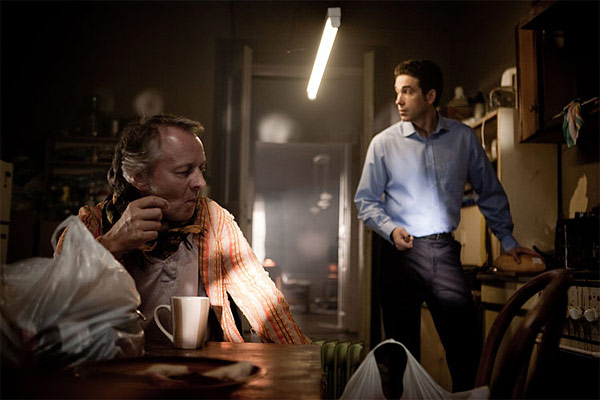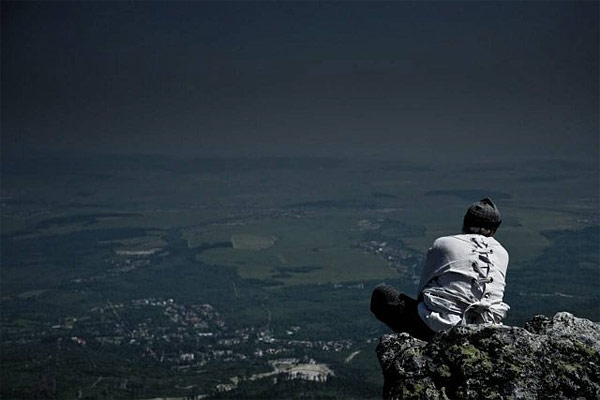After years of hard work, Tomek (Marcin Dorocinski) is about to be promoted to a prestigious position as a TV newsreader. To top his happiness, his partner is about to give him a child. Everything in Tomek’s life feels close to perfection, with the only exception of the relationship with his schizophrenic father.
As we are introduced to Tomek’s character in the first few minutes of Lęk Wysokości (Fear of Falling in English), we know from the start that what we are witnessing will lead, sooner or later, to a painful discovery. The film is all developed in retrospective, with a few flashbacks in the form of private memories in between; what we are shown at the beginning — the opening scene with a desperate Tomek in the underground passage — is explained when the ending brings the story to a conclusion.

 Tomek is well-defined and all-around easy to figure out, even if in the film he is unable to fully communicate with others to alleviate his inner turmoil. His father, well portrayed by Krzysztof Stroinski, is definitely the most interesting character in the film, as he presents us with more questions, most of them unanswered by the screenplay, to ponder about. Whereas we get to know Tomek’s doubts and desires accurately enough, we are not told much about his father’s. The unsaid in the old man’s past adds significant depth to his current situation. However sincere the intentions of his son, Tomek’s father has to work alone on his own fears; appropriately, he also finds release to his afflictions off screen.
Tomek is well-defined and all-around easy to figure out, even if in the film he is unable to fully communicate with others to alleviate his inner turmoil. His father, well portrayed by Krzysztof Stroinski, is definitely the most interesting character in the film, as he presents us with more questions, most of them unanswered by the screenplay, to ponder about. Whereas we get to know Tomek’s doubts and desires accurately enough, we are not told much about his father’s. The unsaid in the old man’s past adds significant depth to his current situation. However sincere the intentions of his son, Tomek’s father has to work alone on his own fears; appropriately, he also finds release to his afflictions off screen.
Fear of Falling offers one of the many possible interpretations on how mental disease can affect both the life of the sick and that of people dealing with it more or less directly. In Konopka’s film, we are given the son’s perspective, we travel with him along the path to acceptance, but it’s with his old man that we are mostly ready to sympathize.
Konopka perhaps gives us a too polished overview on madness and on the difficulty for “normal” people to relate to mental illness and accept it. Stylistically, Fear of Falling feels a little too conventional, with an overabundance of mannerisms as they are usually employed in TV shows and music videos. The routine use of handheld camera, the washed out tones, the distorted images and the Super 8-like segments to signal flashbacks, are all elements that as viewers we have been force-fed for some time now, especially through a certain type of less than memorable cinema, to the point they have become frankly kind of irksome. For instance, the way tones switch from cold to warmer hues from scene to scene following the path of mental insanity feels somewhat too literal. In the same way, the home movie look for episodes from the past that are supposed to offer insight on Tomek’s family and the use of echoing sounds in the father’s house are, even when technically flawless, not very original.
Although this is his first feature film, Konopka demonstrates he knows well his profession. The problem is that he never tries to use the language in a way that is actually personal and distinguishable, so that he gives us the impression we are just watching one of those run-of-the-mill TV features with bleak connotations, rather than the work by an emergent film-maker with a unique sensibility and outlook.
Lęk Wysokości is in competition at the Reykjavík International Film Festival for the Golden Puffin Award.
This movie seems to have the same defects of the american “independent” movies coming from Sundance: the most important thing for the director is the supossed “strong” subject of the movie,forgetting to stylize cinematographically this subject.At last, this kind of movies are interchangeable and perfect for the domesticated actual spectator of “art movies” in original version with subtitles, at least in the spanish screens now.
Sundance is the plague of independent cinema.
The film portrays very well the effects of mental illness on the person affected and on the close members of the family, which in this case is the son. Many features of a psychotic episode, be it related to schizophrenia as it is the case in Fear of Falling or to manic depression ( bipolar type I affective disorder ) appear both in the behaviour of the father and his interactions with other people.
The son does not understand that his father has actually suffered a complete mental breakdown which affects not only his affectivity but also his cognitive faculties and his will power. The father has no control over himself and is just ‘driven’ to do whatever crosses his mind. This is why the son feels so frustrated when he tries to reason with him ( about the filthy state of the flat ) or when he tries to have a conversation with him. This is when it is crucial to make the difference between mental illness and what is commonly referred to as “mental problems’. An episode of mental illness requires urgent and vigorous treatment, which is best provided in a hospital environment because the patient cannot be in charge of his own treatment. He does not realise he is ill and even if he did as in the case of depression, he would still lack the will-power to ‘take his medicine’.
An acute psychotic/ manic episode is a spell of madness that can be eradicted with appropriate treatment ( anti-psychotics ) and the manifestations of the mental illness are then under control with the help of mood stabilisers. However, mental illness is not curable, only the episodes are brought under control with treatment.
Even though the mental hospital has been portrayed as not providing the help that is expected, treatment is still the first step to get the patient over the worst of the spell of illness and support of the family is the next step to ensure better recovery. The family support only, cannot get the patient right if an episode of the illness has already manifested itself, just as a holiday would not significantly improve the state of mind of the patient affected by mental illness. In the film, this is what the son is hoping to achieve.
It is also worth noting, that it is a contradiction for people who have in effect lost their minds through a spell of psychosis to both admit themselves of their own free will to hospital and also to have the freedom to discharge themselves. We all know that in the past relatives may have abused their position to admit people to institutiions when they were not actually mad, but the modern procedure is hardly an alternative. A patient that requires urgent psychiatric treatment cannot be referred for treatment by a member of their family or a carer. Not until they have committed a serious crime will psychotic patients be admitted to hospital without exercising their human rights! In some cases they will have to have committed a very serious offence since the police will not have been able to identify the nature of the illness that made them behave in an anti-social way in the first instance. It would be time to recognise that a patient in urgent need of psychiatric treatment is not capable of assessing his own state of mind and situation.
Thanks for the analysis Marie. Yes, I think the film portrays the mental illness issue in a compelling way, and the aspect that I didn’t convince me about the film was its “technical” side, something about the the style but also about the storytelling. I think the film is still worth watching, especially for acknowledging problems related to mental disorders that are on average portrayed very stupidly in contemporary cinema.